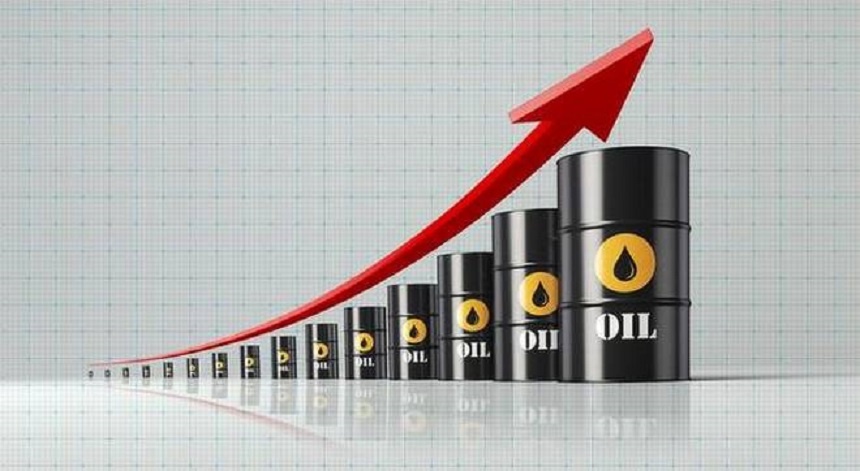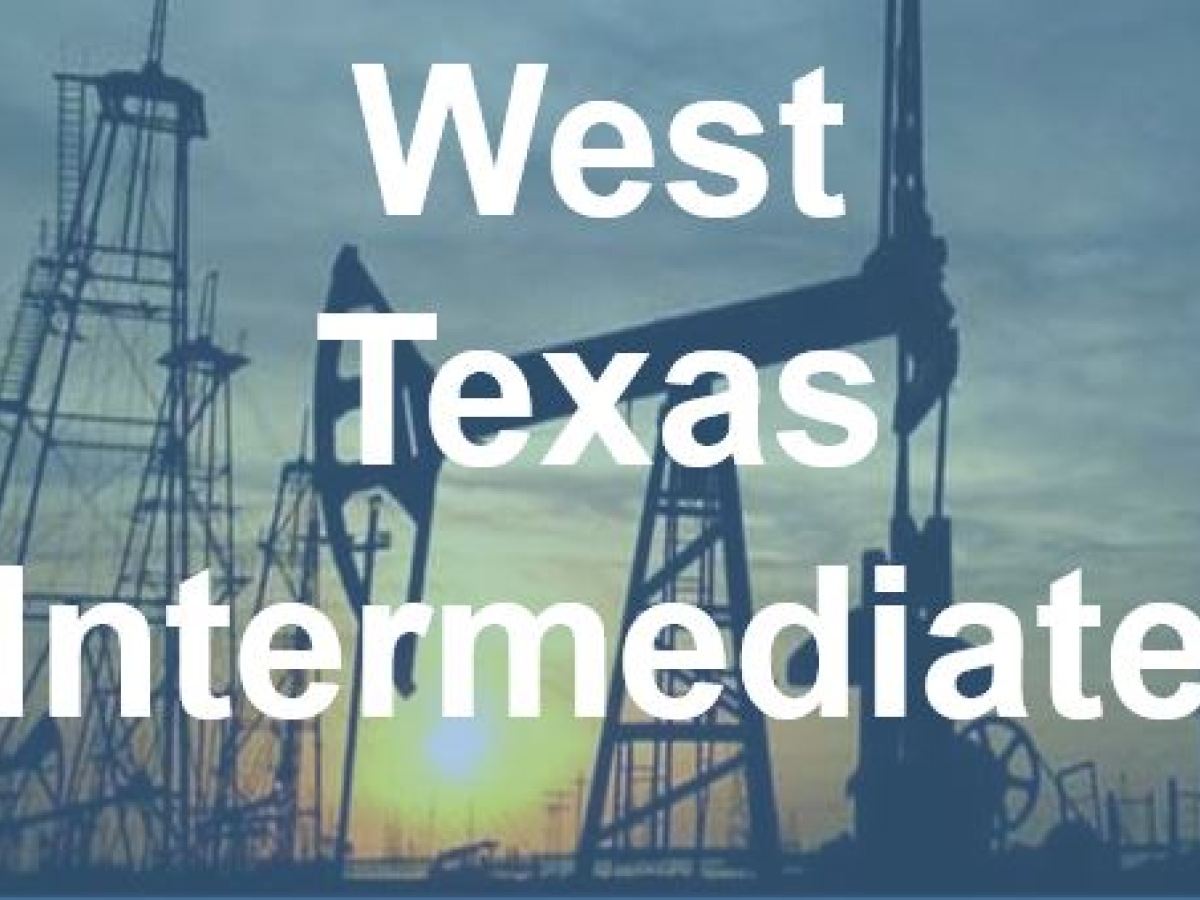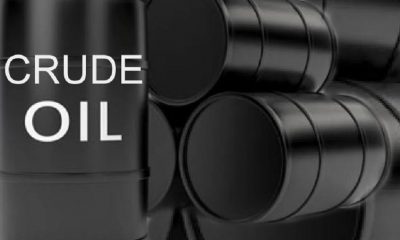Economy
Crude Recovers After Saudi Output Heads to Pre-COVID Levels

By Adedapo Adesanya
Crude prices returned to the bullish region after sinking on a volatile trading Thursday due to a reversal as a result of information that Saudi Arabia’s oil output will soon surpass 10 million barrels per day for the first time since the outset of the COVID-19 pandemic.
Consequently, the Brent crude rose by 75 cents or 0.93 per cent to settle at $81.29 after initially falling to $80.54 a barrel, while the United States West Texas Intermediate (WTI) crude returned to $79.72 after first depreciating to $78.81 a barrel.
Saudi-owned Al Arabiya TV reported that the world’s largest oil exporter would see its export hit the pre-COVID levels after the nation, along with other Organisation of the Petroleum Exporting Countries and its allies (OPEC+) agreed to stick to previously agreed-upon production increases.
Saudi Arabia and Russia, the OPEC and non-OPEC groups leaders within OPEC+, respectively, will each have a production ceiling of just over 10 million barrels per day—at 10.018 million barrels per day each.
OPEC+ will roll over its August programme to gradually increase oil production by 400,000 barrels per day each month ignoring pressure from big players like the US to help cool the market.
According to Russian Energy Minister Alexander Novak after the meeting, “The decision was made previously to increase production by 400,000 barrels per day every month, and I underscore every month, until the end of 2022. Today the decision was reiterated to maintain current parameters which were decided on earlier.”
He added that the market was not heeding the requests and complaints from other countries because they were maintaining market balance and remaining wary of potential changes in demand especially due to uncertain elements like COVID-19.
On his part, the Nigerian Minister of State for Petroleum Resources, Mr Timipre Sylva said “OPEC has made it clear that we are not looking at prices, we are looking at supply and demand. And the supply is not enough to react to what is happening in the market. Especially when you compare it to what is happening in the gas market. As a responsible organisation, it is time to just watch the market.”
Oil prices have recently hit their highest levels since 2014, and crude-importing countries have had to face the brunt.
Recently, US President, Mr Joe Biden, blamed the reluctance of the alliance to pump more oil for the sharp rise in energy prices in the US and around the world.
As per the production table provided by OPEC, the producers will have a collective quota of required production of 40.094 million barrels per day in December, of which the 10 OPEC members bound by the pact should pump no more than 24.3 million barrels per day, and the non-OPEC producers led by Russia will have a ceiling of 15.794 million barrels per day.
Economy
NASD Exchange Rises 1.22% on Sustained Bargain-Hunting

By Adedapo Adesanya
Strong appetite for unlisted stocks further raised the NASD Over-the-Counter (OTC) Securities Exchange by 1.22 per cent on Friday, February 27.
Data revealed that the NASD Unlisted Security Index (NSI) was up by 49.41 points to 4,083.87 points from 4,034.46 points, and lifted the market capitalisation by N19.56 billion to N2.433 trillion from N2.413 trillion.
The volume of securities bought and sold by investors increased by 243.0 per cent to 4.5 million units from 1.3 million units, and the number of deals grew by 15.8 per cent to 44 deals from 38 deals, while the value of securities went down by 19.7 per cent to N82.5 million from N102.8 million.
Central Securities Clearing System (CSCS) Plc ended the session as the most active stock by value on a year-to-date basis with 35.0 million units valued at N2.1 billion, followed by Okitipupa Plc with 6.3 million units worth N1.1 billion, and Geo-Fluids Plc with 122.8 million units transacted for N480.4 million.
Resourcery Plc ended the day as the most traded stock by volume on a year-to-date basis with 1.05 billion units sold for N408.7 million, followed by Geo-Fluids Plc with 122.8 million units valued at N480.4 million, and CSCS Plc with 35.0 million units traded for N2.1 billion.
There were six price gainers yesterday led by FrieslandCampina Wamco Nigeria Plc, which added N9.02 to close at N111.46 per unui compared with the previous day’s N102.44 per unit, Nipco Plc appreciated by N6.00 to N284.00 per share from N278.00 per share, CSCS Plc recouped N1.87 to sell at N70.12 per unit versus Thursday’s value of N68.25 per unit, Geo-Fluids Plc improved by 17 Kobo to close at N3.18 per share versus N3.01 per share, Industrial and General Insurance (IGI) Plc advanced by 5 Kobo to sell at N50 Kobo per unit versus the preceding day’s 45 Kobo per unit, and Acorn Petroleum Plc chalked up 2 Kobo to settle at N1.34 per share, in contrast to the previous day’s N1.32 per share.
Economy
FX Liquidity Crunch Sinks Naira to N1,363/$1 at NAFEX, N1,370/$1 at Black Market

By Adedapo Adesanya
The Naira performed poorly against the United States Dollar in the different segments of the foreign exchange (FX) market on February 27, closing the week without a gain.
In the black market, the domestic currency weakened against the Dollar yesterday by N5 to close at N1,370/$1 compared with Thursday’s closing price of N1,365/$1, and at the GT Bank forex desk, it lost N2 to sell N1,369/$1 versus the N1,367/$1 it was sold a day earlier.
Yesterday, the Nigerian Naira lost N3.75 or 0.26 per cent against the greenback at the Nigerian Autonomous Foreign Exchange Market (NAFEX) to trade at N1,363.39/$1 compared with the previous day’s N1,359.82/$1.
Also, the Naira depreciated against the Euro at the official market during the session by N2.33 to quote at N1,609.22/€1 versus N1,606.89/€1, and appreciated against the Pound Sterling by N6.74 to settle at N1,836.49/£1 compared with the preceding session’s N1,843.23/£1.
The Naira’s latest depreciation occurred as FX demand continued to outpace available supply, intensifying pressure in the market.
In response to the negative momentum, the Central Bank of Nigeria (CBN) intervened by selling Dollars to banks and other authorised dealers in an effort to stabilise the local currency. The move came barely a week after the apex bank had purchased about $190 million from the foreign exchange market to temper the Naira’s rally.
Specifically, the CBN injected $200 million into the official market between Tuesday and Wednesday through an intervention call. However, the liquidity support proved insufficient to reverse the currency’s downward trend.
Meanwhile, the cryptocurrency market declined on Friday, with Solana (SOL) down by 10.4 per cent to $78.60, as Dogecoin (DOGE) decreased by 9.5 per cent to $0.0982.
Further, Cardano (ADA) slumped 8.9 per cent to $0.2647, Ethereum (ETH) slipped by 8.6 per cent to $1,859.10, Ripple (XRP) shrank by 8.2 per cent to $1.30, Litecoin (LTC) lost 1.4 per cent to close at $52.39, Bitcoin (BTC) slid 5.9 per cent to $63,686.39, and Binance Coin (BNB) went down by 4.9 per cent to $596.64, while the US Dollar Tether (USDT) and the US Dollar Coin (USDC) traded flat at $1.00 apiece.
Economy
Oil Prices Climb on Geopolitical Anxiety

By Adedapo Adesanya
Oil prices rose about 2 per cent on Friday, with traders bracing for supply disruptions as nuclear talks between the United States and Iran were without an agreement.
Brent crude futures settled at $72.48 a barrel after chalking up $1.73 or 2.45 per cent, while US West Texas Intermediate crude futures finished at $67.02 a barrel, up $1.81 or 2.78 per cent.
The two sides agreed to extend indirect negotiations into next week, but traders grew sceptical that an agreement between US President Donald Trump’s administration and Iran was possible.
The US and Iran held indirect talks in Geneva on Thursday after Mr Trump ordered a military buildup in the region.
Oil prices gained during the talks, on media reports indicating that discussions had stalled over U.S. insistence on zero enrichment of uranium by Iran. However, prices eased after the mediator from Oman said the two sides had made progress.
They plan to resume negotiations with technical-level discussions scheduled next week in Vienna, Omani Foreign Minister Sayyid Badr Albusaidi said on X.
Market analysts noted that geopolitical risk premiums of $8 to $10 a barrel have been built into oil prices on fears that a conflict will disrupt Middle East supply through the Strait of Hormuz, where about 20 per cent of global oil supply passes.
To cushion the impact from a possible strike, one of the world’s largest oil producers, the United Arab Emirates (UAE), is set to export more of its flagship Murban crude in April, while Saudi Arabia said it would also increase oil production.
Additionally, Saudi Arabia may raise its April crude price to Asia for the first time in five months due to higher demand from India to replace Russian supplies, potentially raising it by about $1 a barrel.
Meanwhile, the Organisation of the Petroleum Exporting Countries and its allies (OPEC+) is likely to consider raising oil output by 137,000 barrels per day for April at its March 1 meeting, after suspending production increases in the first quarter.
The resumption of output increases after a three-month pause would allow Saudi Arabia and the UAE to regain market share at a time when other OPEC+ members, such as Russia and Iran, contend with Western sanctions while Kazakhstan recovers from a series of oil production setbacks.
Eight OPEC+ producers – Saudi Arabia, Russia, the United Arab Emirates, Kazakhstan, Kuwait, Iraq, Algeria and Oman will meet at the meeting on Sunday.
-

 Feature/OPED6 years ago
Feature/OPED6 years agoDavos was Different this year
-
Travel/Tourism10 years ago
Lagos Seals Western Lodge Hotel In Ikorodu
-

 Showbiz3 years ago
Showbiz3 years agoEstranged Lover Releases Videos of Empress Njamah Bathing
-

 Banking8 years ago
Banking8 years agoSort Codes of GTBank Branches in Nigeria
-

 Economy3 years ago
Economy3 years agoSubsidy Removal: CNG at N130 Per Litre Cheaper Than Petrol—IPMAN
-

 Banking3 years ago
Banking3 years agoSort Codes of UBA Branches in Nigeria
-

 Banking3 years ago
Banking3 years agoFirst Bank Announces Planned Downtime
-

 Sports3 years ago
Sports3 years agoHighest Paid Nigerian Footballer – How Much Do Nigerian Footballers Earn


















